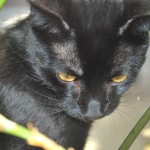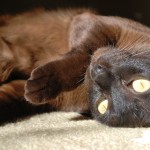The Holistic Approach To Pancreatitis In Pets

Pancreatitis hits close to home for me.
In 2007, my Siamese cat, Poppy, had an acute attack of pancreatitis and she almost died. Fortunately, she had a complete recovery and she’s been fine ever since. It was a turning point for me. It changed my entire approach to animal health. And it was a simple little discovery that unlocked the mystery of pancreatitis.
What’s The Research?
Hardly any.
Pancreatitis is a common complaint amongst cats and dogs. And you would think with a disease that is so common that there would be plenty of research. But, no. There is very little published studies on the treatment and prevention of pancreatitis.
Now, in the severe acute cases where the animal is so sick it has to be hospitalized then there is some medical data for treatment. And, the end results can go anywhere from a high mortality rate to a complete recovery. But, it’s the sub-clinical cases, or the chronic-but-not-so-severe instances of pancreatitis, or the prevention of the disease, is where there is a lack of information.
The most some veterinarians will do is prescribe a low-fat diet for your pet. In the case of my Siamese cat, my vet handed me a carton of canned low-fat cat food and told me she would have to live on it for the rest of her life. The thing is there has been no published clinical trials on whether these prescribed ultra-processed low-fat kibble or canned foods has any beneficial effect on the treatment or prevention of pancreatitis.
A high fat diet has always been blamed for pancreatitis. There are other causes, such as, genetics, drugs, and infections. But it’s not a high-fat diet that’s the problem, it’s carbohydrates. The digestive enzyme Amylase turns carbohydrates into sugar and this spikes blood glucose levels which triggers the pancreas to release insulin. When you feed your cat or dog a high-carb diet, e.g. kibbles, there’s a constant spike of blood sugar which results in insulin resistance and that triggers a chronic low-level inflammation throughout the body.
“… a diet high in fat and low in carbohydrate has been demonstrated to decrease fasting triglyceride levels, which are associated with pancreatitis. Triglycerides are a type of fat found in blood, so it would appear counterintuitive that a low fat, high carbohydrate diet would result in the witnessed increase. Yet, studies have shown that a diet of this composition fed to humans led to both triglyceride overproduction, a consequence of carbohydrates being converted to fat in the liver and delayed clearance from the blood. ” Dr. Mark Roberts
What We Do Know About Pancreatitis
Recently, there has been some good research in the pathophysiology of pancreatitis. It’s in this research we’re seeing success in the use of herbal and dietary therapies.
The Root Cause Of Pancreatitis
Pancreatitis is difficult to diagnose and treat because the cause of the disease is wiped out by the inflammatory response. So, what is the ’cause’ that we’re looking for? Well, for the longest time nobody knew what it was. But, now researchers are beginning to zero in on Nitric Oxide. It appears this compound plays an important role in the pathogenesis of the disease. And this is because it’s Nitric Oxide that is being “wiped out,” or altered, during an active acute pancreatitis attack.
The Role of Nitric Oxide
There are two types of Nitric Oxide that may be present in pancreatitis. The first, is Inducible Nitric Oxide. Nitric Oxide is the main regulator of all exocrine pancreatic activity. Inducible Nitric Oxide regulates the digestive enzyme secretion of the gland. So, basically, you need inducible nitric oxide for a properly functioning pancreas. But, during an acute inflammatory response it becomes excessive, and since Inducible nitric oxide influences blood flow to the pancreas this will cause the tissues to become engorged and edematous, resulting in the enzymes to disgorge. Also, Inducible nitric oxide is a free radical and that will contribute to further damage.
The second type of Nitric Oxide is Endothelial. This is nitric oxide that accumulates inside the blood vessel (unlike Inducible nitric oxide that accumulates in the pancreatic tissues, the PEComas). The more nitric oxide that is coating the blood vessel, the more the blood vessel is sealed up, and this prevents leakage. But, if there is less nitric oxide coating the blood vessel then the endothelial cells start to spilt and open up which allows the white blood cells to leave circulation, squeeze through the cell wall, and get into the PEComas. Eventually, this reaches a critical mass, and suddenly, a lot of Inducible nitric oxide is produced, BUT it’s the lack of Endothelial nitric oxide that triggers pancreatic inflammation. You see how this can be confusing? The vet will do an examination and see plenty of blood, enzymes, and nitric oxide and think “well, there’s nitric oxide in the tissues so it can’t be pancreatitis,” not realizing it’s the reduction of nitric oxide in the blood vessels that’s causing the problem.
It’s interesting to note that researchers say feline pancreatitis is more difficult to diagnosis than that in the canine, citing “nonspecific clinical and biochemical signs” (See: A Case of Feline Pancreatitis).
One other thing: the use of NSAIDS and steroids will inhibit Endothelial nitric oxide and that can trigger pancreatitis, and also, aggravate insulin resistance, which I’ll talk about next:
The Role of Insulin
Also, insulin has a huge influence in triggering pancreatitis. Even though insulin is secreted by the pancreas, the pancreas will become insulin resistant when there is a lack of Endothelial nitric oxide. Insulin resistance can also happen when there’s too much insulin being produced in our body. How does that happen? It happens because for the past couple of decades our western diet of factory-processed foods has increased the insulin levels of the average person by 20% to 30%. This processed diet is also fed to domesticated animals, whether its livestock, or our companion animals. So, that prescription low-fat pet food the vet recommends is still boosting insulin levels which will lead to insulin resistance because of the assimilability and calorie absorption of the food. And this is why dogs/cats suffering from chronic pancreatic inflammation never get well on these prescribed diets. So, what do I recommend? An anti-inflammatory diet of fresh, raw meat which has low or zero carbs, moderate fat, and high protein.
NOTE: Raw fat will not cause pancreatitis, but cooked fat will. Cooked fat will become oxidized and then rancid. So, don’t add bacon grease to your pet’s food, or share your cooked steak or Thanksgiving turkey left-overs with your dog or cat. This is why feeding table scrapes to your pet is a no-no. I should also mention, during manufacturing cooked fat is poured over commercial ultra-processed pet food in order to make it palatable to your dog or cat.
Herbal Intervention For Pancreatitis
A very sick animal that is experiencing an acute pancreatic inflammation is going to be treated differently than sub-acute chronic or prevention of a relapse of pancreatitis.
In Chinese Medicine, acute pancreatitis is considered Damp Heat. Here, the animal would receive harsh, cold, bitter, anti-inflammatory herbs. Anti-Heat herbal formulas are also potent insulin sensitizers. For prevention, it would be very mild, gentle, herbal tonics. These are formulas that finish resolving pancreatitis and to help prevent a relapse (do NOT give tonics during a raging, severe acute pancreatic inflammation).
NOTE: It’s best to work with a practitioner of Chinese herbs so that the correct formula is used for the specific stage and various symptoms of pancreatitis.
Holistic veterinarians have observed that a combination of Chinese herbs and a species appropriate diet of raw meaty bones & organs has shown the most promise for helping your pet recover during an acute episode of pancreatitis and for preventing a relapse. From my own experience, my Siamese cat was immediately switched to a balanced raw meaty bone diet the day she came home from the vet clinic. And that was 11-years ago and she has never had a relapse and I owe that to her diet.
If you have a cat or dog with pancreatitis and you need help with a diet plan and herbal/homeopathic remedies, I would suggest a consultation.
UPDATE (March 2025): A new drug called Panoquell-ca1 has recently been conditionally approved by the FDA for acute canine pancreatitis. If your vet recommends it, it’s a good idea to be aware of the side effects and its interactions with other drugs and morbidities. Please watch this video.










